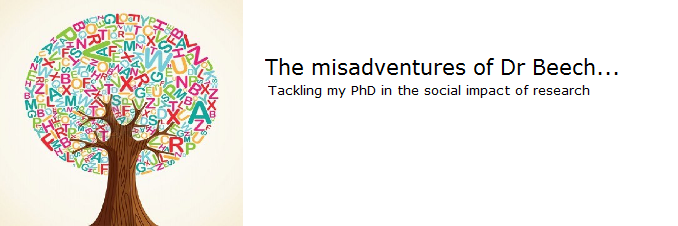 PhD interview nerves
PhD interview nerves
So this week, I have mainly been preparing for my official PhD interview with my (fingers crossed) supervisor to be which takes place on Friday, eeek!
Most of this preparation has involved revisiting my original research propsal and alternately adding to it/fretting about it, and reading a bunch of articles and blog posts surrounding issues of social impact to make sure I can offer some support and context to my research suggestions.
Impact alongside scientific quality
Whilst reading an article on Measuring the Social Impact of Research, I came up against the slightly worrying idea that some researchers might see my focus on social impact as a dismissal of more traditional scientific quality. In this article, Richard (editor of BMJ) talks about how social impact (as defined by social reach, engagement and reuse) and scientific quality (as defined by formal citation and peer review processes) are both important, and both need to be measured.
I think it is important for me to point out that, by focusing my research on social impact, I am not valuing it over scientific quality, but working to extend and enrich the understanding of academic excellence by adding another dimension to the way we assess research. It is clear to me that some research is more notable for it’s social impact, whereas other research may be more focused on purely original contribution, or a combination of both.
So far, assessing academic excellence has been mainly focused on scientific quality in the traditional sense, and, as these assessments tend to result in funding, it gives research falling into this category an advantage over research more focused on social impact.
Whilst I am not saying that social impact is more important than scientific quality, I am arguing that it deserves to be measured and recognised in equal amounts, to somewhat level the playing field.
